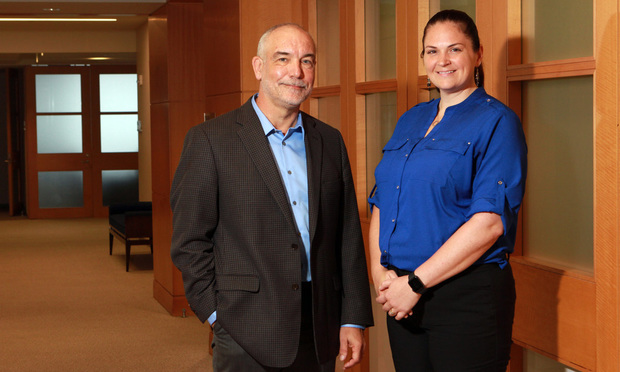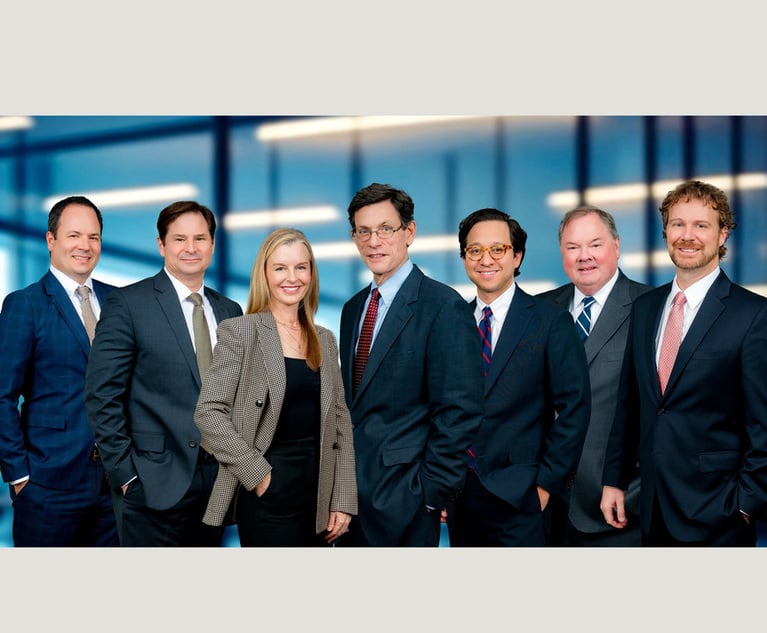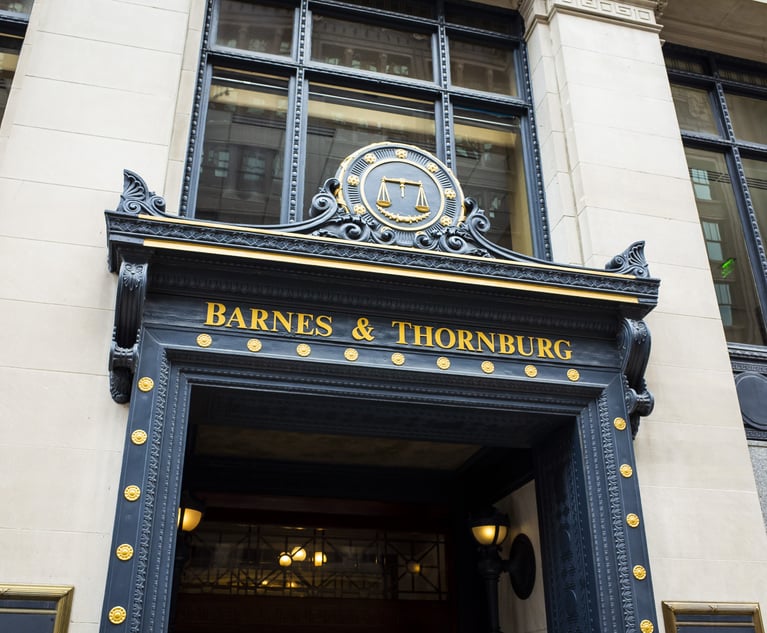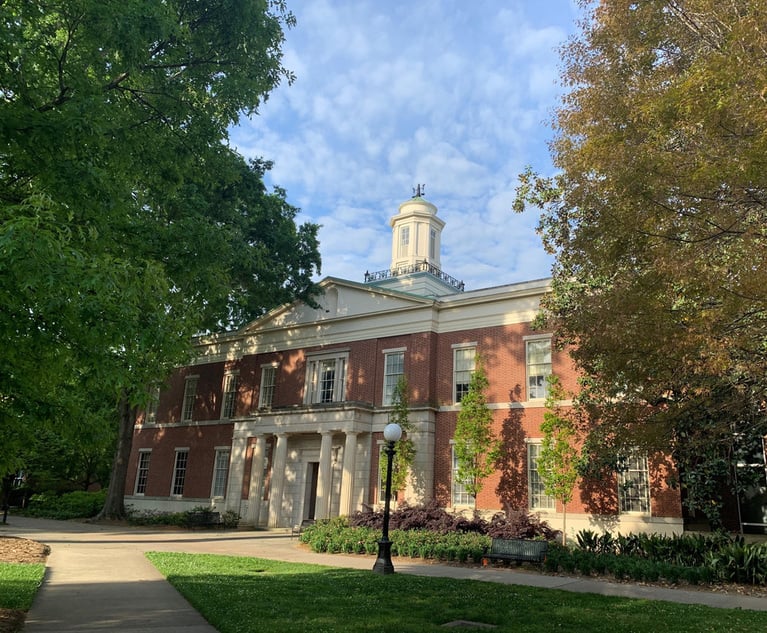Drew Eckl's New Partnership Course for Associates Goes Beyond Business Development
The midsize firm wants to help senior associates learn the skills to make partner. A broader aim is to increase associate satisfaction and retention.
August 28, 2019 at 04:19 PM
5 minute read
 Joe Chancey (left) and Christy Walsh of Drew Eckl in Atlanta. (Photo: John Disney/ALM)
Joe Chancey (left) and Christy Walsh of Drew Eckl in Atlanta. (Photo: John Disney/ALM)
Drew Eckl & Farnham is going beyond the usual business development training to teach associates how to make partner.
Motivated to both guide associates and increase retention, the Atlanta-based midsize firm this year launched a one-year course for its senior associates that offers comprehensive training on the business side of law and nonlegal skills needed to be a good partner.
The core of the program, Path 2 Partnership, is a yearlong, 25-hour course for sixth-year associates. The course, which is mandatory for partnership consideration, started in January with a daylong boot camp featuring presentations on how Drew Eckl makes a profit, having difficult conversations and what it takes to be an effective leader.
The group has been convening once a month for workshops. Christy Walsh, Drew Eckl's director of marketing and business development, calls it a "mini-MBA program" for them.
Monthly topics have included: How to run a matter smoothly (including what to delegate), e-discovery and using big data—namely the firm's accumulated data on case outcomes, opposing counsel, experts and matter time.
"You can be a great lawyer and not understand the nuts and bolts of how law firms make money," said the firm's managing partner, Joe Chancey, noting that he majored in English in college.
Business development training was the initial impetus, Walsh said, but when she started working with various committees and practice leaders to design the program, a broader need emerged for coaching on other aspects of becoming a partner.
Business development is not neglected. Walsh holds individual, 30-minute check-ins every month with each associate on their business development plan. They brainstorm about potential clients and set a couple of actions for the associate, like reaching out to referral sources, to do before their next meeting.
Improving Retention
The goal is to help senior associates learn the range of skills they need to make partner, Chancey said, but the broader aim is to increase associate satisfaction and retention by fostering better communication among associates and partners.
Drew Eckl started in 1983 as a litigation defense firm and has expanded into corporate, real estate and other areas of law. It's grown to 118 lawyers with about 40 associates.
"For a firm of our size, to lose even two or three senior associates that we really wanted to keep is a big blow to us," Chancey said, since Drew Eckl has invested in them for five or six years.
Chancey said that he and his partners were hearing a lot of frustration from associates about communication. The millennials wanted continual feedback, starting in their first year, on how they were doing and their progression toward partnership.
That's a far cry from when Chancey was starting out in the 1980s. Back then, he said, associates "figured they'd make partner in seven or eight years if no one was yelling at them."
"We underestimated the level of frustration, so we designed a structured program," he said.
Every new associate now receives a Partnership 101 package that lays out expectations. The partners also fielded associates' questions on what is required of equity partners and created a FAQ to answer them. Drew Eckl has started quarterly training for junior associates, and that culminates in the Path 2 Partnership course for sixth years.
While all sixth years are eligible, the program isn't mandatory for all, Chancey said, noting that some senior associates are not interested in becoming equity partners.
The inaugural class is made up of 10 associates, who are sixth year and up, and 11 nonequity partners, Walsh said, because the firm wanted to include everyone who'd find it useful.
Results So Far
Early indicators show that the Path 2 Partnership course is producing results.
Since January, Walsh said, associate turnover among the firm's roughly 40 associates has decreased by 7.7%. Even better, departures by senior associates have decreased by 57%.
Walsh and Chancey are paying close attention to the participants' feedback.
The June training on how to close the deal with a client and, relatedly, pricing a matter has been one of the most popular, Walsh said.
Drew Eckl partners have a lot of autonomy in setting rates, Chancey said, so learning how to price a matter is important—including the use of alternative fee arrangements.
"I'd like to get all the equity partners in for that one," he said.
Some equity partners, who are invited to all sessions, attended the June training on closing the deal and April's workshop on mental health, Walsh said. "Stress is an issue for everyone—especially in our profession," Chancey said, adding that the firm has made mental health training mandatory for all of its lawyers.
Chancey added that the sessions are building relationships among the senior associates and partners. Partners have told him that they've been meaning to talk to associates about how they're doing, but then trials or depositions come up and the conversations don't happen. "This creates a structure where the conversations must occur," he said.
This content has been archived. It is available through our partners, LexisNexis® and Bloomberg Law.
To view this content, please continue to their sites.
Not a Lexis Subscriber?
Subscribe Now
Not a Bloomberg Law Subscriber?
Subscribe Now
NOT FOR REPRINT
© 2025 ALM Global, LLC, All Rights Reserved. Request academic re-use from www.copyright.com. All other uses, submit a request to [email protected]. For more information visit Asset & Logo Licensing.
You Might Like
View All
On The Move: Squire Patton Boggs, Akerman Among Four Firms Adding Atlanta Partners
7 minute read

Georgia Justices Urged to Revive Malpractice Suit Against Retired Barnes & Thornburg Atty
4 minute read
Trending Stories
- 1ACC CLO Survey Waves Warning Flags for Boards
- 2States Accuse Trump of Thwarting Court's Funding Restoration Order
- 3Microsoft Becomes Latest Tech Company to Face Claims of Stealing Marketing Commissions From Influencers
- 4Coral Gables Attorney Busted for Stalking Lawyer
- 5Trump's DOJ Delays Releasing Jan. 6 FBI Agents List Under Consent Order
Who Got The Work
J. Brugh Lower of Gibbons has entered an appearance for industrial equipment supplier Devco Corporation in a pending trademark infringement lawsuit. The suit, accusing the defendant of selling knock-off Graco products, was filed Dec. 18 in New Jersey District Court by Rivkin Radler on behalf of Graco Inc. and Graco Minnesota. The case, assigned to U.S. District Judge Zahid N. Quraishi, is 3:24-cv-11294, Graco Inc. et al v. Devco Corporation.
Who Got The Work
Rebecca Maller-Stein and Kent A. Yalowitz of Arnold & Porter Kaye Scholer have entered their appearances for Hanaco Venture Capital and its executives, Lior Prosor and David Frankel, in a pending securities lawsuit. The action, filed on Dec. 24 in New York Southern District Court by Zell, Aron & Co. on behalf of Goldeneye Advisors, accuses the defendants of negligently and fraudulently managing the plaintiff's $1 million investment. The case, assigned to U.S. District Judge Vernon S. Broderick, is 1:24-cv-09918, Goldeneye Advisors, LLC v. Hanaco Venture Capital, Ltd. et al.
Who Got The Work
Attorneys from A&O Shearman has stepped in as defense counsel for Toronto-Dominion Bank and other defendants in a pending securities class action. The suit, filed Dec. 11 in New York Southern District Court by Bleichmar Fonti & Auld, accuses the defendants of concealing the bank's 'pervasive' deficiencies in regards to its compliance with the Bank Secrecy Act and the quality of its anti-money laundering controls. The case, assigned to U.S. District Judge Arun Subramanian, is 1:24-cv-09445, Gonzalez v. The Toronto-Dominion Bank et al.
Who Got The Work
Crown Castle International, a Pennsylvania company providing shared communications infrastructure, has turned to Luke D. Wolf of Gordon Rees Scully Mansukhani to fend off a pending breach-of-contract lawsuit. The court action, filed Nov. 25 in Michigan Eastern District Court by Hooper Hathaway PC on behalf of The Town Residences LLC, accuses Crown Castle of failing to transfer approximately $30,000 in utility payments from T-Mobile in breach of a roof-top lease and assignment agreement. The case, assigned to U.S. District Judge Susan K. Declercq, is 2:24-cv-13131, The Town Residences LLC v. T-Mobile US, Inc. et al.
Who Got The Work
Wilfred P. Coronato and Daniel M. Schwartz of McCarter & English have stepped in as defense counsel to Electrolux Home Products Inc. in a pending product liability lawsuit. The court action, filed Nov. 26 in New York Eastern District Court by Poulos Lopiccolo PC and Nagel Rice LLP on behalf of David Stern, alleges that the defendant's refrigerators’ drawers and shelving repeatedly break and fall apart within months after purchase. The case, assigned to U.S. District Judge Joan M. Azrack, is 2:24-cv-08204, Stern v. Electrolux Home Products, Inc.
Featured Firms
Law Offices of Gary Martin Hays & Associates, P.C.
(470) 294-1674
Law Offices of Mark E. Salomone
(857) 444-6468
Smith & Hassler
(713) 739-1250






